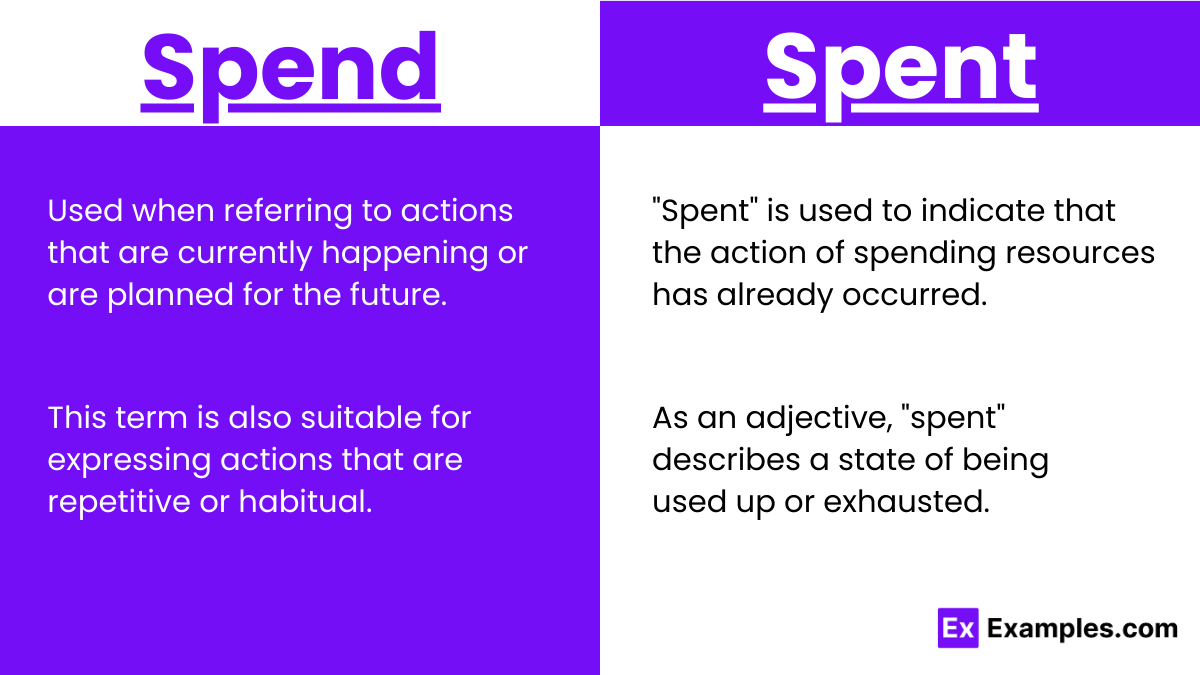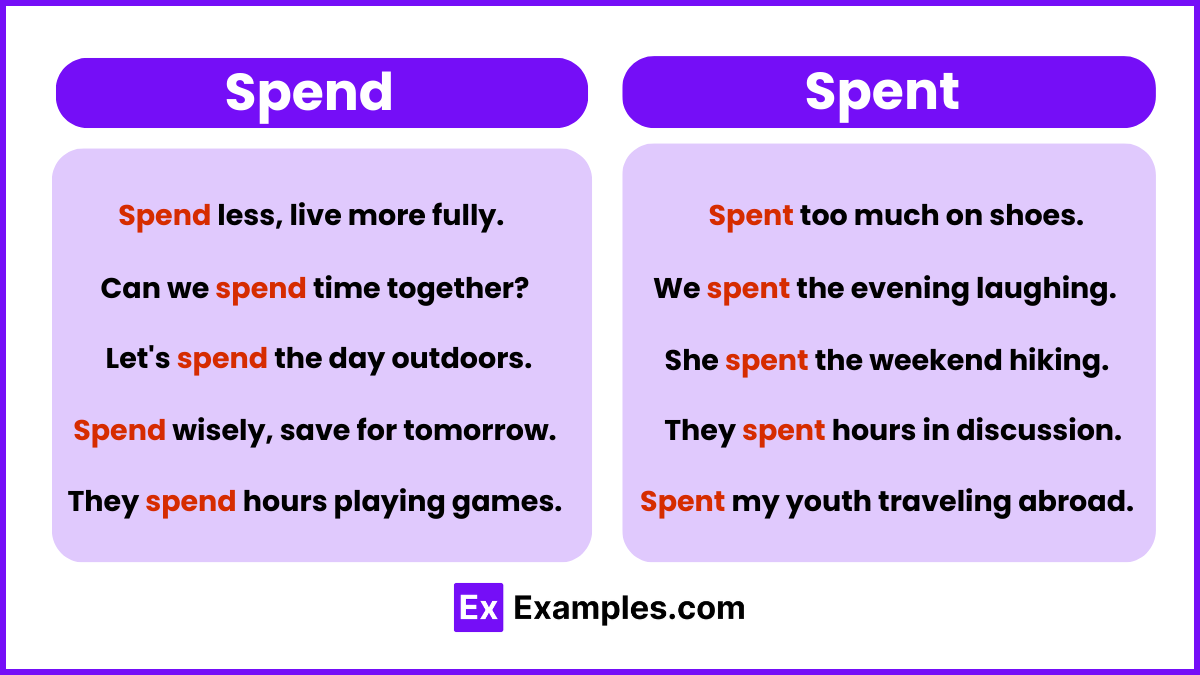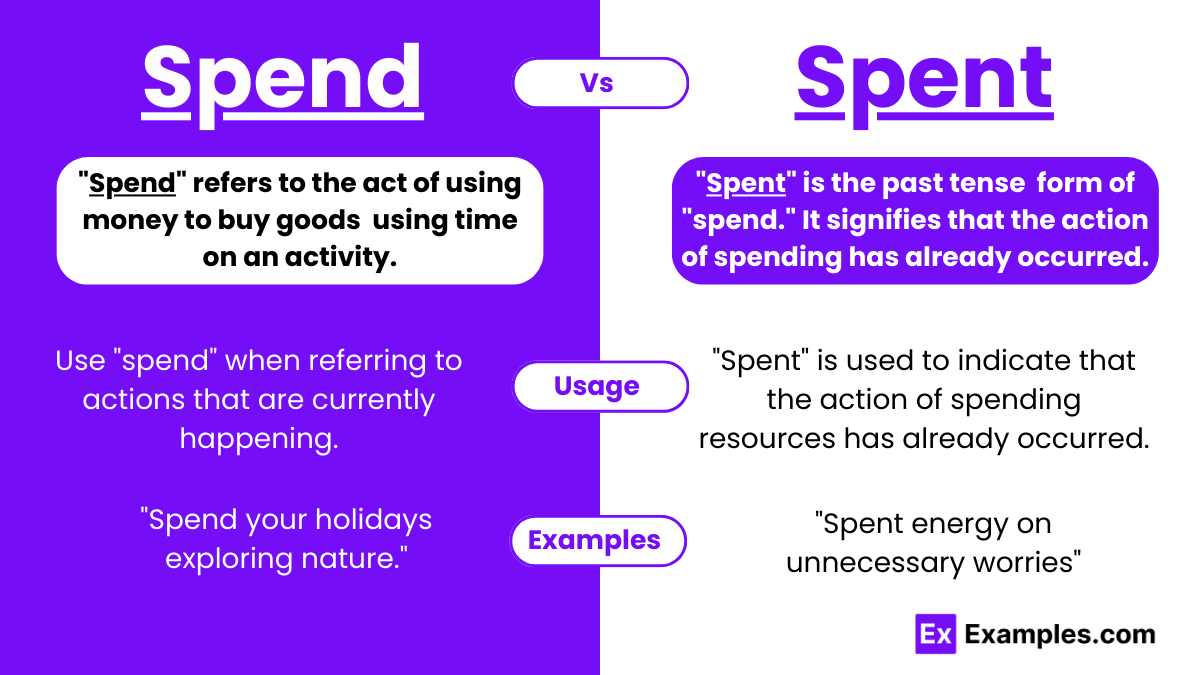Spend vs Spent – Meanings, Difference, Examples, When to use
Understanding when to use “spend” and “spent” can be a bit tricky since they are related but used differently. “Spend” is the base form of the verb, typically used to talk about using money or time. For example, “I want to spend time with my family.” On the other hand, “spent” is the past tense form, used for actions that happened in the past. For example, “I spent all my savings on a new bike.” This short guide aims to clarify these differences and help you use “spend” and “spent” correctly in your sentences, making your English more accurate and effective.
Spend and Spent – Meanings
- Spend: As a verb, “spend“ refers to the act of using money to buy goods or services, using time on an activity, or expending energy or resources on something. It’s a dynamic word that captures the action of allocation or consumption.
- Spent: “Spent” is the past tense and past participle form of “spend.” It signifies that the action of spending has already occurred, whether it be money, time, energy, or resources. “Spent” can also be used as an adjective to describe something that has been used up or exhausted, such as “spent batteries.”
Summary
“Spend” is the act of using up or allocating something, like when you spend money on groceries or spend time reading a book. “Spent,” in contrast, indicates that this action has been completed, as in “I spent all my savings” or “He is spent after the marathon,” the latter showing the adjective form. Remember, “spend” (with a “d” at the end) marks the completion of the action, aligning with other past tense verbs.
How to Pronounce Spend and Spent
- Spend: Pronounced as /spɛnd/ (spend).
- Spent: Pronounced as /spɛnt/ (spent).
The pronunciation difference lies in the final consonant sound, distinguishing their uses in speech.
Differences between Spend and Spent
| Aspect | Spend | Spent |
|---|---|---|
| Grammatical Role | Active Verb | Past Tense/Past Participle, Adjective |
| Temporal Aspect | Present/Future | Past/Current (when used as an adjective) |
| Indicative Action | Act of allocating or using resources | Completed action or state of being used up |
| Example Use | “She plans to spend her savings on a new car.” | “He was spent after the day-long hike.” |
| Effect | Implies an intention or ongoing action | Suggests completion or exhaustion |
| Usage Nuance | Centers on the process of expenditure | Emphasizes the outcome or aftermath of spending |
How to Remember the Difference between Spend and Spent
To differentiate “spend” from “spent,” remember that “spend” indicates the current or future action of using resources, while “spent” reflects the past action or the state of exhaustion. The “t” in “spent” can remind you of “terminated” or “completed,” signifying that the action is in the past.
When to Use Spend and Spent

Usage of Spend
- Present or Future Actions: Use “spend” when referring to actions that are currently happening or are planned for the future. It denotes the act of using resources like time, money, or energy, and is appropriate for discussing ongoing or intended activities.
- Active Verb Form: “Spend” is always used as an active verb. It is the word to choose when you need to describe the action of allocating resources in a sentence, making it the driving force of the statement.
- Continuous or Habitual Actions: This term is also suitable for expressing actions that are repetitive or habitual. When talking about regular activities or routines that involve the use of resources, “spend” is the correct term to employ.
- Indicative of Choice or Decision: Employ “spend” when indicating a deliberate choice or decision about how to use resources. It implies a level of control or intention in how something like time or money is being allocated.
- Non-Past Tense Contexts: In grammatical terms, “spend” is used in non-past tense forms, including present simple, present continuous, and future tenses. It’s the form to use when the action of spending has not yet been completed or is an ongoing process.
Usage of Spent
- Completed Actions: “Spent” is used to indicate that the action of spending resources has already occurred. It is the past tense form of “spend” and is appropriate for recounting events or actions that have been concluded.
- Past Tense Narratives: In storytelling or when narrating past events, “spent” is the correct choice. It situates the action of spending in the past, providing a temporal context that indicates completion.
- Describing Exhaustion: As an adjective, “spent” describes a state of being used up or exhausted. It’s applicable when referring to objects that are no longer usable or to individuals who are physically or mentally drained.
- After Action Consequences: “Spent” is suitable for discussing the aftermath or consequences of spending actions. It implies that the resources in question have been consumed and are no longer available.
- Passive Constructions: In passive voice constructions where the focus is on the object that has undergone the action of spending, “spent” is often used. It’s part of a construction that highlights the effect of the action on the subject or object rather than the action itself.
How to use Spend and Spent
Spend
Use of Spend as a Verb
- When “spend” is used as a verb, it primarily refers to the action of using or giving out resources such as money, time, or energy, often in exchange for goods, services, or experiences. This action implies a reduction in the amount of the resource that one possesses.
Spent
Use of Spent as a Verb and as an Adjective
- As a Verb: When used as the past tense and past participle of the verb “spend,” “spent” denotes the action of using or giving out resources such as money, time, or energy that has already occurred. It indicates that the resources were used up or consumed in the past.
- As an Adjective: As an adjective, “spent” describes something that has been used up and is therefore no longer useful or effective. It often refers to objects that cannot be used again or to people who are extremely tired or exhausted.
Spend and Spent – Examples

Examples of Spend
- Moreover, I plan to spend my weekend hiking in the mountains to relax.
- Consequently, we must spend more resources on research to ensure success.
- Furthermore, she decided to spend her evening practicing piano, enhancing her skills.
- Additionally, they agreed to spend a significant portion of the budget on marketing.
- Similarly, he aims to spend his savings on investments that promise good returns.
Examples of Spent
- However, she spent all her energy on the project and had none left for chores.
- Therefore, after they spent the entire budget, the team had to seek additional funding.
- Meanwhile, he spent the afternoon fixing the car, missing the football game.
- Previously, we spent considerable time discussing the issue, yet no solution was found.
- Eventually, after they spent years in different cities, they decided to move back together.
Synonyms
| Spend | Spent |
|---|---|
| Utilize | Exhausted |
| Allocate | Depleted |
Exercise
Fill in the blanks with either “spend” or “spent” to complete the sentences accurately.
- She has ________ all her savings on a new startup venture.
- I plan to ________ more time with my family this weekend.
- After the long hike, they were completely ________.
- How much money do you usually ________ on groceries each week?
- He ________ his childhood roaming the vast countryside.
- The machine is ________; it’s not functioning anymore.
Answers
- spent
- spend
- spent
- spend
- spent
- spent
FAQ’S
How Did I Spend or Spent?
Use “spend” for present or future actions, and “spent” for past actions. Example: “How did I spend my day?”
Is It Just Spent or Just Spend?
Use “spend” for current or future activities, and “spent” when referring to completed actions.
How Do You Use Spent in a Sentence?
“Spent” indicates past actions, e.g., “I spent the weekend hiking in the mountains.”
Which Is Past Tense: Spent or Spend?
“Spent” is the past tense of “spend,” used for actions that have already occurred.
What Is Spent in Grammar?
In grammar, “spent” is the past tense and past participle form of “spend,” used for completed actions.


